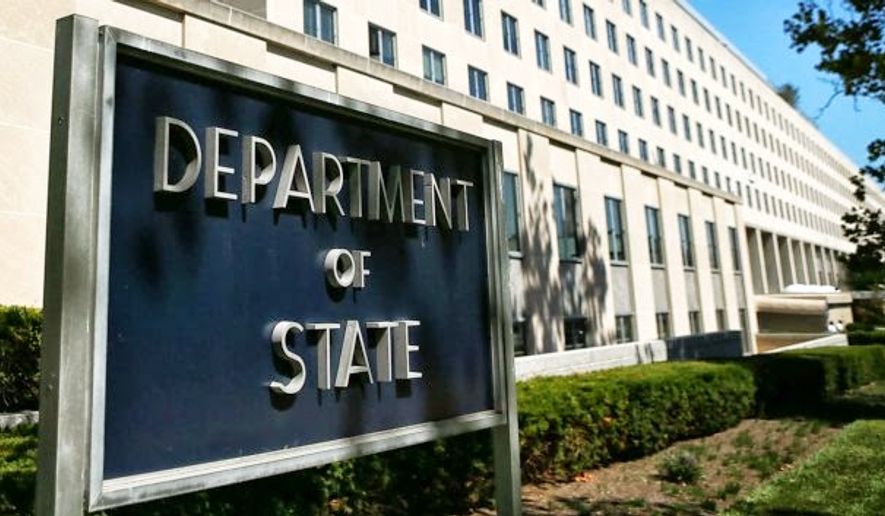The State Department unit devoted to countering disinformation and propaganda is failing to take the lead on government-wide efforts to expose foreign lies and deception, according to a new survey by the department’s internal inspector general.
The Global Engagement Center (GEC) still lacks the authority to carry out its mission and has not been led by presidentially-appointed officials for nearly half its existence, the IG stated following an eight-month probe that ended in March — despite having a staff of 167 people, mostly non-government contractors, and an annual budget of over $74 million.
The GEC was first set up in 2016 to counter terrorist propaganda and expanded under a provision of the 2017 defense authorization act to lead government-wide efforts to expose and counter foreign disinformation.
The IG “observed, and GEC senior leadership and department and interagency officials confirmed, the center’s role in countering disinformation was limited to supporting the various U.S. government efforts rather than leading and coordinating a whole-of-government approach as mandated by law,” according to the report, which was made public last week.
The poor performance “contributed to a lack of coordination among countering disinformation programs across the U.S. government,” the report said. “Foreign actors spend billions of dollars on disinformation campaigns to establish and legitimize their narratives using constantly changing technology, requiring an agile response from the U.S. government.”
The watchdog report found that the center’s response was hampered by problems with contracting, communicating and operating efficiently in dealing with foreign propaganda. Additionally, the center’s mission must deal with competing counter-disinformation programs at multiple government agencies, including the Homeland Security Department, Pentagon and Office of the Director of National Intelligence.
In one instance cited by the IG auditors, the center could not evaluate whether $8.5 million sent to 34 U.S. embassies last year for counter-disinformation activities achieved the desired results.
Within the State Department, the IG found that GEC was blocked from publishing a report on Iranian disinformation aimed at influencing U.S. policy toward Syria by the Bureau of Near Eastern Affairs. The bureau opposed publishing the report apparently over concerns it would upset delicate diplomatic activities underway with Iran, the report said.
A cloud computing site called “DisinfoCloud” set up outside the State Department also was canceled before creating an internal replacement. The cloud site allows government agencies and others to monitor hundreds of companies and test tools and technologies needed in countering foreign disinformation.
The disjointed organizational structure and staffing at GEC also limited its effectiveness, the report stated, noting poor communication within divisions and unclear chains of command.
GEC carried out an internal restructuring in 2021 that the IG said “merely formalized an existing contractor-heavy structure.”
Foreign disinformation and propaganda from terrorists and foreign governments is a growing problem, the IG report said. Recent examples include attempts to influence the 2020 U.S. elections and ongoing disinformation campaigns online about the safety of U.S.-produced COVID-19 vaccines.
Critics have said products produced by the center have lacked useful information about disinformation operations targeting the United States.
The GEC initially focused on foreign terrorism and then reported mostly on Russian activities.
Last month, the center produced a comprehensive assessment on the Chinese Communist Party’s efforts to shape global public opinion regarding what the U.S. government has concluded is a genocide program targeting minority Uyghurs in western China.
A review of the GEC website shows that 14 of its 16 published reports highlighted Russian disinformation. Only two were devoted to exposing Beijing disinformation.
The IG report said the center received mixed reviews for its work. A regional State Department office praised GEC’s Analytics and Research Division for a report on Chinese repression of Uyghurs in China and details it provided on Chinese exploitation of Twitter for propaganda, and another office lauded a report on internet troll farms in El Salvador.
“However, others told [the office of inspector general] they did not view the division’s reports as responsive to their needs or containing usable information and criticized their lack of context and analysis,” the report said.
One example was a GEC report on the murky origins of the COVID-19 virus that the IG said lacked context in explaining the data it published.
One GEC success was an August 2020 report, “The Pillars of Russia’s Disinformation and Propaganda Ecosystem,” which used publicly available information to expose Russian disinformation tactics and sources. That report was useful for foreign governments, civil society organizations, academia, the media and the general public in helping analyze Russia’s disinformation, the IG report concluded.
GEC officials said the report helped “significantly degrade” the ability of Russian proxy sites on social media platforms to influence public opinion around the world.
Leah Bray is the center’s special envoy and coordinator and has held the post since July 2021. Her principal deputy, Daniel Kimmage, was on loan to the National Defense University at the time of the IG inspection.
The IG listed 18 recommendations for improving GEC operations and the center said it would implement the changes.
A GEC spokeswoman did not immediately respond to an email request for comment.
In an appendix to the IG report, Joe Parente, deputy coordinator for support, acknowledged the center has struggled since its creation. Setting up a new office while working to counter disinformation is like “building the plane while flying it,” he stated.
• Bill Gertz can be reached at bgertz@washingtontimes.com.




Please read our comment policy before commenting.